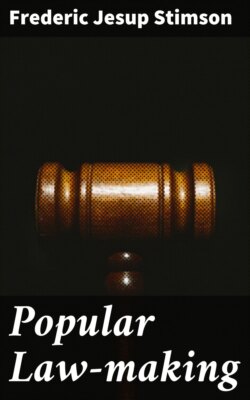Читать книгу Popular Law-making - Frederic Jesup Stimson - Страница 28
На сайте Литреса книга снята с продажи.
A.D. 690. WESSEX KING INI.
ОглавлениеCAP. 11. "If any one sell his own countryman, bond or free, though he be guilty, over sea, let him pay for him according to his 'wer.'"
As to "wer." Now there were slaves in England in those days; at the time of the Conquest the Domesday Book reports twenty-five thousand. Slaves, I mean; not the unfree agricultural laborers, they were in a higher class, but the regularly bound slaves, who were descendants, either of the early British inhabitants or of the Saxons themselves, who had been punished in the courts and had been sentenced into slavery, or men who had voluntarily sold themselves into slavery. For under early Saxon law a man could sell his child into slavery if the child were under seven years old, and above fourteen the child could sell himself. This refers, of course, to that; it is really a kind of predecessor of our Thirteenth Amendment; that is, it forbids slavery; it forbids making new slaves. The word "wer" is the word we have in "wer-wolf," meaning blood; for instance, "weregild" is a man's blood money. Every man had a price from the king down; if a man killed the king he had to pay, we will say, fifty thousand pounds; if a thane, it might be one or two thousand; if an ordinary freeman, one hundred pounds, and so on.
CAP. 36. "Let him who takes a thief, or to whom one taken is given, and he then lets him go, or conceals the theft, pay for the thief according to his 'wer.' If he be an ealdorman, let him forfeit his shire, unless the king is willing to be merciful to him."
Now the earliest direct legislation about personal property in a statute is as late as 1100; but this early Saxon law was a recognition of personal property, because a man cannot steal a thing unless there is property. This section, therefore, implies property in personalty; because a man cannot steal land; but it never occurred to them to pass a law saying that there shall be private property, because that was the unwritten law that they were all supposed to know.
